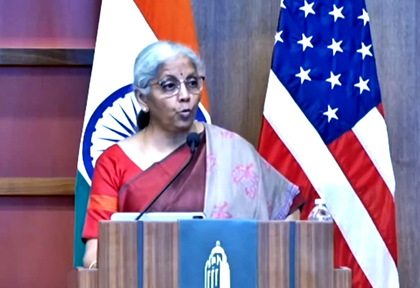‘Viksit Bharat’ journey a shared national mission: FM Sitharaman
By IANS | Updated: April 22, 2025 09:57 IST2025-04-22T09:50:55+5:302025-04-22T09:57:07+5:30
New Delhi, April 22 India’s journey to become a ‘Viksit Bharat’ by 2047 is not merely an aspiration ...

‘Viksit Bharat’ journey a shared national mission: FM Sitharaman
New Delhi, April 22 India’s journey to become a ‘Viksit Bharat’ by 2047 is not merely an aspiration but a shared national mission powered by a vision for inclusive, sustainable, and innovation-led growth, Union Finance Minister Nirmala Sitharaman has said.
During her address at the Hoover Institution at Stanford University in the US, the Finance Minister said that India has risen from the world’s tenth-largest economy to the fifth-largest, a clear sign of “our growing strength and global relevance”.
“Despite the pandemic shock and a banking crisis, our progress over the past decade, anchored in strong macroeconomic fundamentals and steady reforms, gives us confidence and direction for the road ahead,” she told the gathering during her keynote address, titled ‘Laying the foundations for a developed India #ViksitBharat by 2047’.
FM Sitharaman said that some of the works done in India stand out, and one such example is that of Digital Public Infrastructure (DPI) and its success.
“More than a billion digital identities have been created using DPI. Using these digital identities, bank accounts of people were created, and during the Covid-19 pandemic, money was transferred by the government with a click of a button. DPI also came in useful in administering vaccines during the Covid-19 pandemic,” the Finance Minister mentioned during her speech.
“In my interactions with the G20, the World Bank or the IMF, this singular population-scale achievement of India is repeatedly lauded,” she added.
According to the Union Minister, over the next two decades, sustaining India’s growth momentum calls for a fresh approach grounded in bold reforms, stronger domestic capacities, renewed institutional partnerships and adaptive strategies suited for the evolving global landscape.
“The last two Union Budgets have laid the groundwork for this transformation, with a clear multi-sectoral policy agenda,” she informed.
As we lay the foundation for a developed India, we must stay committed to long-term goals, without losing sight of present realities, she stressed.
The global order is changing. That poses challenges but also opportunities. We must be prepared to tackle the former while seizing the latter.
“A Viksit Bharat will be shaped not only by the government but by the collective effort of every citizen. This vision calls upon us to think boldly, act inclusively, and stay resilient and flexible," said the Finance Minister.
A vibrant and thriving network of small and medium enterprises is essential for domestic manufacturing to grow.
“The government has undertaken numerous initiatives to support MSMEs, from easing access to credit, redefining size thresholds, facilitating prompt payments from large buyers and simplifying compliance burdens,” according to the Minister.
The Open Network for Digital Commerce, launched in April 2022, has successfully onboarded more than 7,64,000 vendors across 616 cities.
“Our next focus is reducing regulatory frictions, digitising approvals, and integrating MSMEs into global value chains. Special support to women-led and rural enterprises will help enhance economic opportunities and ensure more inclusive growth,” FM Sitharaman noted.
Over the past decade, a significant thrust on infrastructure development has also created a strong foundation for manufacturing-led growth by bolstering investor confidence, she added.
This has been enabled by a more than four-fold increase in the Union government’s capital expenditure (Capex) between 2017-18 and the 2025-26 Budget.
“Over the last decade, we have undertaken structural reforms, rationalising over 20,000 compliances, decriminalising business laws and digitising public services to reduce friction. Our experience with implementing the Business Reform Action Plan by different state governments has demonstrated that deregulation is a powerful catalyst for industrial growth,” the Finance Minister further stated.
A report by Indiaspora and BCG shows that Indian first-generation immigrants founded 72 unicorns between 2018 and 2023. These unicorns were worth at least USD 195 billion in valuation and employed nearly 55,000 people.
More than 65 per cent of Global Capability Centres (GCC) in India have their headquarters in the US. These GCCs provide high-value-added, bespoke services in areas such as R&D, management consulting and auditing.
“While the US is a mature startup hub which has developed over 50-60 years, India’s startup journey is a nascent one. Over the course of the last decade, the government’s focus was on reducing the cost of entrepreneurial risk-taking by removing regulatory and infrastructural barriers,” she emphasised.
Disclaimer: This post has been auto-published from an agency feed without any modifications to the text and has not been reviewed by an editor
Open in app